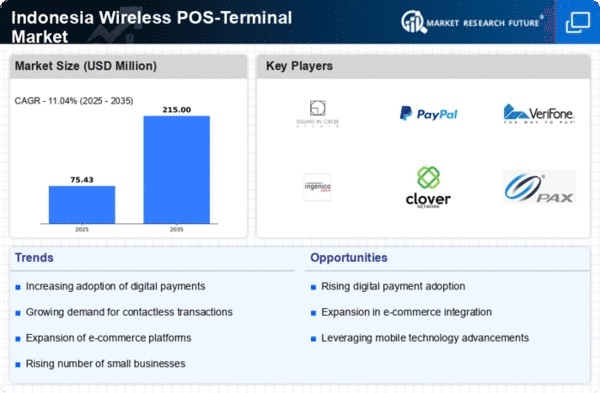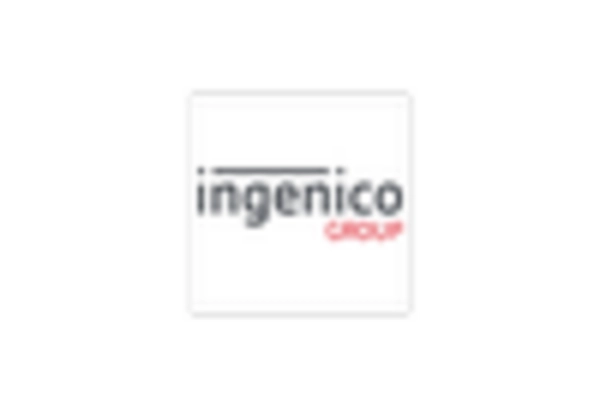Expansion of E-commerce Platforms
The rapid growth of e-commerce in Indonesia is significantly influencing the wireless pos-terminal market. With online retail sales projected to reach $50 billion by 2025, businesses are increasingly adopting wireless pos-terminals to facilitate in-person transactions. This shift is driven by the need for integrated payment solutions that can handle both online and offline sales. As e-commerce platforms expand their reach, they require reliable payment systems to enhance customer experience. Consequently, the wireless pos-terminal market is likely to see increased demand from retailers looking to bridge the gap between digital and physical sales channels. This trend suggests a robust future for wireless payment solutions in the Indonesian retail landscape.
Increasing Smartphone Penetration
The proliferation of smartphones in Indonesia is a pivotal driver for the wireless pos-terminal market. As of 2025, smartphone penetration in the country is estimated to exceed 70%, facilitating the adoption of mobile payment solutions. This trend indicates that consumers are increasingly comfortable using their devices for transactions, which in turn drives demand for wireless pos-terminals. Retailers and service providers are likely to invest in these terminals to cater to tech-savvy customers. Moreover, the integration of mobile wallets with wireless pos-terminals enhances transaction efficiency, potentially increasing sales for businesses. The wireless pos-terminal market is thus positioned to benefit from this growing smartphone ecosystem, as more consumers seek seamless payment experiences.
Growth of Small and Medium Enterprises (SMEs)
The expansion of small and medium enterprises (SMEs) in Indonesia is a significant driver for the wireless pos-terminal market. SMEs account for over 60% of the country's GDP and are increasingly adopting technology to enhance operational efficiency. As these businesses seek to modernize their payment systems, the demand for wireless pos-terminals is likely to rise. The ability to accept various payment methods, including mobile wallets and credit cards, is essential for SMEs to remain competitive. This trend suggests that the wireless pos-terminal market will continue to thrive as SMEs invest in digital payment solutions to cater to a growing customer base.
Government Initiatives for Financial Inclusion
The Indonesian government is actively promoting financial inclusion, which serves as a vital driver for the wireless pos-terminal market. Initiatives aimed at increasing access to banking services for unbanked populations are likely to boost the adoption of wireless payment solutions. By 2025, the government aims to reduce the unbanked population to below 20%, which could lead to a surge in demand for wireless pos-terminals in rural and underserved areas. This focus on financial inclusion not only supports economic growth but also encourages businesses to invest in wireless payment technologies. The wireless pos-terminal market is thus positioned to expand as more individuals gain access to digital payment options.
Rising Consumer Preference for Contactless Payments
Consumer behavior in Indonesia is shifting towards contactless payment methods, which is a crucial driver for the wireless pos-terminal market. As of November 2025, approximately 40% of consumers prefer contactless transactions due to their convenience and speed. This preference is likely to encourage merchants to adopt wireless pos-terminals that support NFC technology. The ability to process payments quickly and securely is becoming essential for businesses aiming to enhance customer satisfaction. Furthermore, the wireless pos-terminal market is expected to grow as more consumers embrace the safety and efficiency of contactless payments, indicating a significant transformation in payment habits across the country.
















